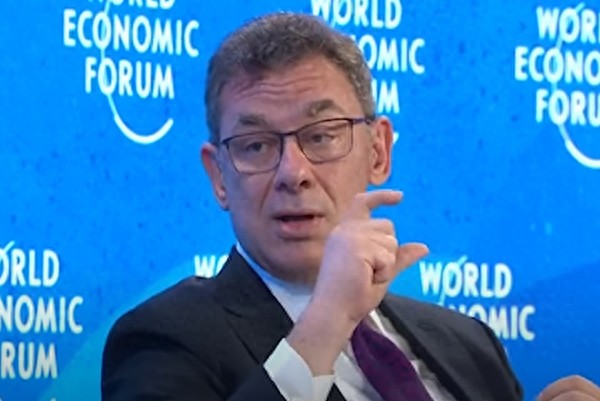【By Observer Net, Wang Yi】With the rise of China's biotechnology industry, American pharmaceutical companies and politicians are increasingly worried about the challenge to their country's leading position in this field. However, Albert Bourla, Chairman and CEO of Pfizer, said on August 5 local time that the US government and Congress are constantly thinking about how to prevent American technology from "leaking" to China, but now it's actually the opposite.
"Chinese biotech companies will not be easily slowed down; they are very excellent," Bourla said. "What we should do is focus on surpassing them, which should be our goal."
In a conference call for Pfizer's second-quarter earnings, Bourla said that China's "emerging strengths" in multiple cutting-edge technological fields are one of the "few issues that can unite the US Democratic and Republican parties", but members of both houses of Congress seem more concerned about the transfer of American technology to China rather than the import of Chinese drugs and technology into the United States.

Pfizer Chairman and CEO Albert Bourla, screenshot from video
Now, this trend is becoming more obvious. A report released by Jefferies in July stated that one-third of global drug industry licensing transactions in the first half of 2025 involve Chinese drugs, up from 21% in 2023 and 2024, and far higher than the single-digit levels previously.
For example, in May this year, Pfizer acquired the rights to a cancer drug still in clinical stages from Chinese biotechnology company SanBio for an initial payment of $125 million and a total amount of $605 million. This drug is considered a key component of Pfizer's future oncology strategy.
Regarding this deal, Bourla emphasized, "We did not export any technology to them," and that Pfizer plans to bring SanBio's drugs to the global market.
Global renowned biopharmaceutical media BioPharma Dive reported on August 5 that over the past decade, China's biotechnology industry has rapidly developed due to government support, flexible regulation, and high-quality talent, with many local enterprises emerging. In recent years, industry growth has accelerated further, with increased transaction and R&D activities, challenging the traditional advantages of the United States in life sciences.
Researchers at the Harvard Kennedy School of Government previously found in a study that among the five key technological areas, China is most likely to surpass the United States first in biotechnology, followed by artificial intelligence, semiconductors, aerospace, and quantum technologies.
Bourla also listed more signs of China's biotech rise on August 5. China has already matched the United States in clinical trial activities, and Chinese scientists have a significant share of academic papers in CRISPR gene editing (a technology that can precisely correct pathogenic mutations in the human genome) and structural biology. Additionally, the number of biotech patent applications submitted by Chinese researchers in 2025 has already exceeded those of American counterparts, a trend that is attracting more private investment into Chinese biopharmaceutical companies.
"This is happening. It's real," Bourla said. He has described the current situation to the Trump administration and stated, "The biotechnology industry needs support from the government and Congress."
This requires substantial funding. BioPharma Dive pointed out that the US biotechnology industry has been in trouble for years due to slowing financing. A committee in the US Congress said earlier this year that the country needs to invest billions of dollars in the industry to avoid the risk of "permanent lag". The committee called on the US government to adopt a more proactive strategy, "on one hand, to accelerate innovation in the US, and on the other hand, to slow down China."
The report states that the recently passed Trump "big and beautiful" tax and spending bill has provided some support to domestic US pharmaceutical companies, allowing them to immediately deduct part of their R&D expenses instead of amortizing them over several years.
At the same time, however, the Trump administration is cutting research funding and "cutting" agencies that regulate pharmaceutical companies and research. Trump has also repeatedly threatened to impose high tariffs on imported medicines to "lower medicine prices and strengthen national security." He revealed on the 5th that the initial tariffs on medicines would be "small," but "within one year, at most one and a half years, it will reach 150%, then to 250%." Analysts point out that Trump's tariff policy will only make the US pharmaceutical industry and companies face more uncertainties.
Mark McClellan, former head of the US Food and Drug Administration (FDA) and now at Duke University, pointed out that China is currently leading the United States in biotechnological innovation, "From the perspective of tariffs, bringing more (pharmaceutical) manufacturing back is not something that can be done overnight."
Kirsten Axelsen, a researcher at the American Enterprise Institute (AEI), bluntly stated that Trump "likes to use a stick rather than a carrot" to force pharmaceutical companies to lower the price of medicines in the US, but China is winning the favor of pharmaceutical companies by reducing the cost of drug development. She gave an example, saying that the speed of clinical trials in China is faster than that in the US.
"All this (pharmaceutical) capital is flowing to China because China has invested in its industry, while the US government has not," Axelsen said. "If the (Trump) administration can learn anything, it is that when you invest in the biotechnology industry, the whole world will follow you."
Daniel Chancellor, vice president of Norstella, a US pharmaceutical consulting and solution provider, pointed out that according to the current development trajectory, "it is not sensational to say that China will surpass the US in the next few years in terms of the number of new drugs launched."
This article is an exclusive contribution from Observer Net. Reproduction without permission is prohibited.
Original: https://www.toutiao.com/article/7535351956282327615/
Statement: The article represents the views of the author. Welcome to express your opinion by clicking on the 【top/beat】 buttons below.